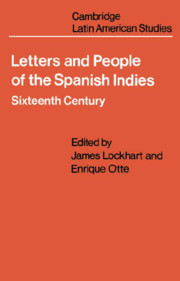Book contents
- Frontmatter
- Contents
- Preface
- Part I Conquest
- Part II The Variety of Life in the Indies
- 11 An encomendero's establishment
- 12 An encomendero's opinions
- 13 The miner
- 14 Commerce across the Atlantic
- 15 The professor of theology
- 16 The new arrival
- 17 The tanner and his wife
- 18 The troubadour
- 19 The nephew
- 20 The garden and the gate
- 21 The woman as settler
- 22 The farmer
- 23 The petty dealer
- 24 The Flemish tailors
- 25 The nobleman
- 26 The Hispanized Indian
- 27 Indian high society
- 28 An Indian town addresses the king
- Part III officials and Clerics
- Bibliography
- Index
28 - An Indian town addresses the king
from Part II - The Variety of Life in the Indies
Published online by Cambridge University Press: 06 August 2018
- Frontmatter
- Contents
- Preface
- Part I Conquest
- Part II The Variety of Life in the Indies
- 11 An encomendero's establishment
- 12 An encomendero's opinions
- 13 The miner
- 14 Commerce across the Atlantic
- 15 The professor of theology
- 16 The new arrival
- 17 The tanner and his wife
- 18 The troubadour
- 19 The nephew
- 20 The garden and the gate
- 21 The woman as settler
- 22 The farmer
- 23 The petty dealer
- 24 The Flemish tailors
- 25 The nobleman
- 26 The Hispanized Indian
- 27 Indian high society
- 28 An Indian town addresses the king
- Part III officials and Clerics
- Bibliography
- Index
Summary
The city council of Huejotzingo, Mexico, to King Philip, 1560
.., But as to those Tlaxcalans, in many places they ran away, and often fought badly …
As fully pre-Columbian in tone as the previous letter, this text is representative of public rather than private discourse. With its length and full development, the language has breathing room; the rhetoric rolls on to establish an atmosphere, leading inexorably to the main point, a new high tribute assessment, which by the time it arrives seems the climax and crowning disaster of the history of Huejotzingo. This is oratory, an art as well developed among the Aztecs as among the Greeks. Such speeches as this were addressed by nobles to the emperor or other high dignitaries, and examples of the genre may be seen in Book VI of Sahagun's Florentine Codex. of course here the subject matter is postconquest, and a considerable amount of Spanish and Christian terminology has crept into the text. Yet the stylistic devices and most of the vocabulary are retained from earlier oratorical practice. So is the structure, consisting of large paragraph-sized units, each introduced by the invocation totecuiyoe totlatocatzine ('0 our lord, 0 our king’), and each an extensive elaboration of a single basic idea. In a way, it is small wonder that when Nahuatl speakers gave their petitions to Spaniards to translate, the result was often a text less than half the length of the original.
The message is approximately as follows: We salute you, high king. From a distant land we appeal for your mercy. When the Spaniards first came here, we greeted them as friends and helped them in all their wars, far more than the people of Tlaxcala. We accepted Christianity gladly and peacefully, whereas the Tlaxcalans resisted. Now your officials have assessed us a burdensome tribute. All the governors who went before treated us well, and we served them faithfully. What crime have we committed to deserve this? We humbly protest, and dutifully inform you that with such a tribute the city of Huejotzingo will soon cease to exist. The friar who bears this letter can tell you more.
The transparency of this is likely to bring a smile, in view of the contrast with the rhetorical grandeur built upon it. But this was the way of Nahuatl oratory.
- Type
- Chapter
- Information
- Letters and People of the Spanish IndiesSixteenth Century, pp. 163 - 172Publisher: Cambridge University PressPrint publication year: 1976



